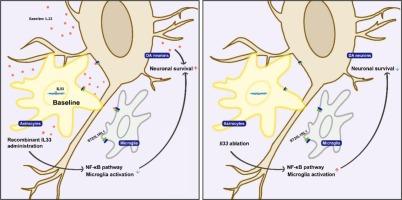Interleukin-33 promotes dopaminergic neuron survival and inhibits glial activation in Parkinson’s disease models
IF 7.6
2区 医学
Q1 IMMUNOLOGY
引用次数: 0
Abstract
Interleukin-33 (IL33) plays a critical role in modulating immune and inflammatory responses across various diseases, yet its influence on Parkinson’s disease (PD) remains elusive. In this study, we provide substantial evidence that global depletion of Il33 exacerbates PD pathology and motor deficits in vivo. Moreover, Il33 deficiency diminishes the communication between astrocytes and microglia, leading to a more profound injury to primary neurons in vitro. Notably, the application of recombinant IL33 (rIL33) following MPTP treatment or α-synucleinA53T overexpression partially inhibits the reduction in TH expression, glial activation, and the motor dysfunctions in vivo. Collectively, our findings demonstrate the opposed effects of Il33 deletion and rIL33 administration on neuroinflammation in PD, emphasizing the therapeutic potential of IL33 in regulating neuroinflammation and neuronal viability in the central nervous system (CNS).

在帕金森病模型中,白细胞介素-33促进多巴胺能神经元存活并抑制胶质细胞激活
白细胞介素-33 (il -33)在调节多种疾病的免疫和炎症反应中起着关键作用,但其对帕金森病(PD)的影响尚不明确。在这项研究中,我们提供了大量证据表明Il33的整体耗竭会加剧PD病理和体内运动缺陷。此外,Il33缺乏减少星形胶质细胞和小胶质细胞之间的交流,导致体外原代神经元受到更严重的损伤。值得注意的是,在MPTP治疗或α-synucleinA53T过表达后应用重组IL33 (rIL33)部分抑制TH表达减少、胶质细胞激活和体内运动功能障碍。总的来说,我们的研究结果证明了il - 33缺失和rIL33给药对PD患者神经炎症的相反作用,强调了il - 33在调节中枢神经系统(CNS)神经炎症和神经元活力方面的治疗潜力。
本文章由计算机程序翻译,如有差异,请以英文原文为准。
求助全文
约1分钟内获得全文
求助全文
来源期刊
CiteScore
29.60
自引率
2.00%
发文量
290
审稿时长
28 days
期刊介绍:
Established in 1987, Brain, Behavior, and Immunity proudly serves as the official journal of the Psychoneuroimmunology Research Society (PNIRS). This pioneering journal is dedicated to publishing peer-reviewed basic, experimental, and clinical studies that explore the intricate interactions among behavioral, neural, endocrine, and immune systems in both humans and animals.
As an international and interdisciplinary platform, Brain, Behavior, and Immunity focuses on original research spanning neuroscience, immunology, integrative physiology, behavioral biology, psychiatry, psychology, and clinical medicine. The journal is inclusive of research conducted at various levels, including molecular, cellular, social, and whole organism perspectives. With a commitment to efficiency, the journal facilitates online submission and review, ensuring timely publication of experimental results. Manuscripts typically undergo peer review and are returned to authors within 30 days of submission. It's worth noting that Brain, Behavior, and Immunity, published eight times a year, does not impose submission fees or page charges, fostering an open and accessible platform for scientific discourse.

 求助内容:
求助内容: 应助结果提醒方式:
应助结果提醒方式:


